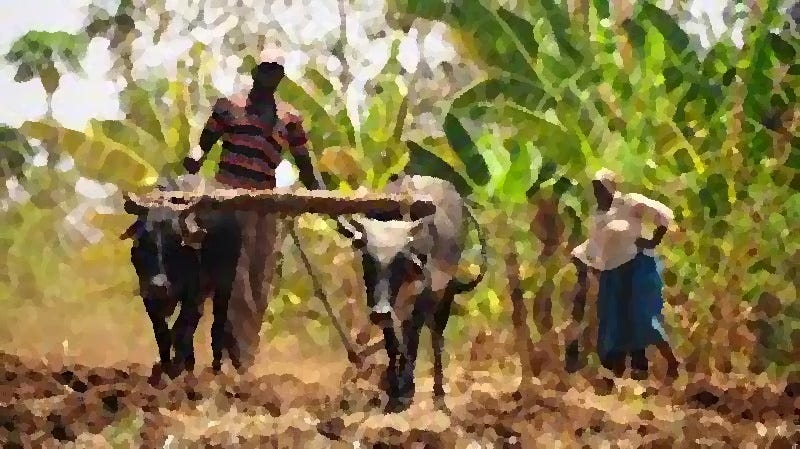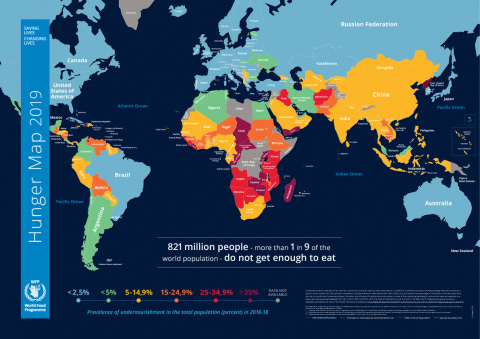Hunger In Africa Defies Logic But Is Predictable
Everyone loves to invoke the big picture, offering a macro understanding of a situation that can be obfuscated by minor details. But when it comes to hunger in Africa there's a constant focus on emotionally charged, tiny pictures coupled with an effort to avoid connecting the revealing dots that expose the underlying truth. The Hunger Map 2019 from the World Food Programme (WFP), the big picture if you will, illustrates the issue of global human malnutrition, but without context.
The WFP, yet another United Nations organization cleverly based in Western civilization—beautiful Rome, Italy—was created in 1961, and despite an impressive website with colorful graphics and platitudes, its work over the last 58 years has not delivered permanent solutions. Entire countries have been built and rebuilt in that timeframe, but there's an overarching academic and bureaucratic arrogance that masks an ineptitude in identifying the root cause of the problem.
As a side note, a business identifies a puzzle, solves it, and moves on. However, an often overlooked aspect of most charities and international organizations is that they're not designed to succeed, especially when the problem is part of their name, but rather to deliver crumbs and appear to be helpful, while providing a livelihood to people that wouldn't be able to operate in the competitive private sector.
Their track records are the proof, and it's preferable for them to give a man a fish, rather than to teach a man how to fish. Why? It runs counter to human self-interest because solving problems leads to the eventual termination of their jobs, and the concept is rather common among politically sponsored welfare programs. If a voter moves up on the economic ladder, he/she may change the vote to protect his/her new found self-interest. Thus, the supply of voters at the lower economic levels must be maintained or replenished, or some people will lose their paychecks. Got the big picture?
An article by The Economist highlights what most people don't know about Africa:
IF POTENTIAL were edible, Africa would have the best-fed people on earth. The vast continent has 60% of the world’s uncultivated arable land, most of it unfarmed. The land already under cultivation, mostly by small farmers, could produce far more. Crop yields in Africa are between one-third and one-half of the global average. The quality of soil is often poor, because of overfarming, but that could be fixed by fertilisers. With the right know-how and inputs, Africa’s farmers could double productivity.
Mind boggling: "60% of the world's uncultivated arable land," yet "Africa has the highest prevalence of undernourishment, estimated in 2016 to be 20% of the population" according to World Hunger Education Service. Notably and in contrast, Norway's arable land is a meager 2.7%, and only 1/4 of the European Union's land can be cultivated.
One common accusation—scapegoat, really—is that Western Europeans robbed the African continent of its resources, but colonization ended a long time ago and the soil is still there. The proven counter argument is that Africans wouldn't know how to exploit their own resources, which are consumed in markets created by none other than the much despised Western civilization. To add perspective to the economic big picture, the aggregate Gross Domestic Product (GDP) of Africa, consisting of 54 countries with over 1.2 billion people, is $2.2 trillion, which is less than the United Kingdom's GDP of $2.8 trillion, a country with less than 67 million people. Why?
Here are the facts: Africa has 60% of the world's arable land, 17% of the world population, but has 30% of the world's undernourished human beings, and a GDP smaller than the United Kingdom. What's wrong with this big picture?
For example, Angola is a major oil producer on the African west coast and member of OPEC. It became independent from Portugal in 1975, and has an area 14 times larger than Portugal, with only 3 times the population. However, the prevalence of undernourishment is within the 25%-34.9% segment, while Portugal's is less than 2.5%, as depicted by the Hunger Map 2019.
Needless to say, learning is conducted mostly through observation, and it appears that knowledge evaporated after the colonizers left Africa, almost 50 years ago. One argument is often made that indigenous people in Africa were not properly trained by the occupiers, but the question that follows cannot be answered with ease by those on a quest for excuses: Who taught Western civilization how to do anything?
As already discussed in "If Only Native Americans Had The Aptitude…," one cannot avoid highlighting that America was a vast wasteland before colonizers arrived, and the implication is hardly welcome by those seeking answers to the same problem, decade in and decade out. The root cause of the problem is staring at them, but the glaring facts are always avoided to prevent offending human sensibilities while the purported humanitarian aid process endures, replete with pretentious sociological and technological solutions that continuously and predictably fail to deliver the goods.
And then, if they could only get their hands on yet more resources, they lament. We're talking agriculture here, not the invention and manufacturing of semiconductors in cleanrooms. "How Africa could feed the world" was published in 2012, and it was nothing more than the typical emotional, nonsensical, tried and failed proposals that culminated in yet another plea for more international help, or money from Western civilization as it is known. What happened to the loud cry that we're all one race and intellectually equal? Nobel laureate James Watson was heavily penalized for suggesting the contrary.
Not sure about other planets, but on Earth it's always about the people, and for Africa to be able to produce agricultural products on par with Western civilization and solve the continent's widespread hunger problem, it would have to be under new management. The virtually non-existent record of socio-techno-economic achievement cannot be refuted, and despite emotionally driven rants and accusations, this is not about racism and hatred, but rather about facing the facts without relying on Pixie Dust or looking through a kaleidoscope. The time has come to put up or shut up!



